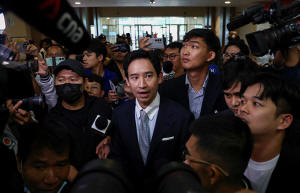Thai court orders dissolution of anti-establishment election winner
 Send a link to a friend
Send a link to a friend
 [August 07, 2024]
By Chayut Setboonsarng and Panu Wongcha-um [August 07, 2024]
By Chayut Setboonsarng and Panu Wongcha-um
BANGKOK (Reuters) -Thailand's Constitutional Court on Wednesday ordered
the dissolution of the anti-establishment opposition party Move Forward,
ruling its campaign to amend a law that protects the monarchy from
criticism risked undermining the democratic system.
The disbandment of Move Forward, which won most seats in the 2023
election, is the latest setback for Thailand's major political parties
that are embroiled in a two-decade battle for power against a nexus of
influential conservatives, old money families and the royalist military.
The decision, which included 10-year political bans for 11 party
executives, comes six months after the same court ordered Move Forward
to drop its plan to reform a law on royal insults, ruling it was
unconstitutional and tantamount to undermining the system of governance
with the king as head of state.
In a unanimous ruling that cited the court's January decision, the
judges said Move Forward had improperly used the monarchy to gain an
election advantage, putting the palace in conflict with the people.
"The action of the accused is therefore an action that may antagonize
the democratic system with the king as the head of state," they said in
the ruling.

King Maha Vajiralongkorn has been on the throne for seven years. The
monarch is enshrined in the constitution as being in a position of
"revered worship" and the palace is seen by royalists as sacrosanct.
Perceived insults of the monarchy are punishable by up to 15 years in
jail.
Move Forward has repeatedly denied seeking to undermine the royal
family. The party had no immediate comment on the ruling and was due to
give a press conference later on Wednesday.
BACKUP PLAN
Though the dissolution is likely to anger millions of young and urban
voters who backed Move Forward and its progressive agenda, the impact of
the ruling is expected to be limited.
The party's surviving 143 lawmakers will keep their seats in parliament
and are expected to reorganize under a new party, as they did in 2020,
when predecessor Future Forward was disbanded over a campaign funding
violation.
Move Forward's influential rivals coalesced to block the party from
forming a government last year but the progressive movement remains a
political force and a threat to the status quo, bent on pursuing a
platform that includes military reform and undoing big business
monopolies.
[to top of second column]
|

Former Move Forward Party leader Pita Limjaroenrat speaks to the
members of the media in Bangkok, Thailand, August 7, 2024. REUTERS/Chalinee
Thirasupa

It is not yet out of the woods, however, with 44 of its current and
former politicians, including 26 legislators, the subject of a
complaint to an anti-graft body by conservative activists seeking
lifetime political bans over the campaign to change the royal
insults law.
Some supporters called for protests against the decision. At Move
Forward's headquarters, its loyalists expressed both disappointment
and disbelief at the ruling.
"It feels like we have hit rock bottom, truly hit rock bottom," said
Sirinapa Veillet, 58. "It feels like we have no support left, none
at all," she said of Thailand's democratic institutions.
Amnesty International in a statement called the ruling an "untenable
decision" and said authorities were relentlessly harassing the
political opposition.
Move Forward's disbandment comes at critical juncture in Thai
politics, with cracks appearing also in an uneasy truce between the
military-backed establishment and another longtime rival, the
populist ruling party, Pheu Thai.
Pheu Thai has suffered most in Thailand's intractable crisis, with
four of its prime ministers toppled by coups and court rulings and
three previous incarnations dissolved by courts, leading to at times
violent street demonstrations.
The Constitutional Court will next week decide on a case brought by
40 conservative former senators seeking to dismiss Prime Minister
Srettha Thavisin over his appointment to cabinet of a lawyer who
served time in jail. Srettha denies wrongdoing.
Tycoon Srettha's case is among factors that have heightened
political uncertainty, with the prospect of political upheaval if he
is removed.
A new premier would need to be voted on by parliament, potentially
pitting Pheu Thai against coalition partners and leading to a
shakeup of the governing alliance and realignment of cabinet and
policies.
(Reporting by Panarat Thepgumpanat, Chayut Setboonsarng, Panu
Wongcha-um and Napat Wesshasartar; Editing by Martin Petty and Angus
MacSwan)
[© 2024 Thomson Reuters. All rights
reserved.]This material
may not be published, broadcast, rewritten or redistributed.
Thompson Reuters is solely responsible for this content.
 |